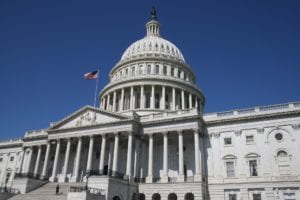Who is a member?
Our members are the local governments of Massachusetts and their elected and appointed leadership.

The U.S. Capitol building.
In a letter to Congressional leaders and the Trump administration on April 16, three nationwide local government organizations urged the federal government to provide $250 billion in support for the local response to and recovery from COVID-19.
The National Association of Counties, National League of Cities and U.S. Conference of Mayors are jointly advocating for “robust, dedicated, and flexible funding for all local governments in any interim emergency coronavirus package currently being negotiated.”
The International City/County Management Association joined the effort with an April 18 letter to congressional leaders asking for additional federal aid to help localities recover revenue losses attributable to the COVID-19 crisis.
The efforts are supported by the state municipal leagues across the country, including the MMA, which, working with the National League of Cities, has secured the support of the Massachusetts congressional delegation.
“Local and state governments face a massive fiscal crisis due to the economic freeze caused by the coronavirus pandemic,” said MMA Executive Director Geoff Beckwith, who also serves on the NLC’s Board of Directors. “Without direct federal aid, no state or community, including Massachusetts and our 351 cities and towns, will be able to navigate the looming crisis without unprecedented and very painful budget cuts.”
The bipartisan Coronavirus Community Relief Act (HR 6467), which has 134 co-sponsors in the House, would provide $250 billion in direct aid to cities and towns across the country. A matching bill is being filed in the Senate, with a dozen co-sponsors expected. The funds could be used to support essential services, make up for revenue losses, and keep communities strong during the economic downturn.
A survey of more than 2,100 local officials conducted by the National League of Cities and U.S. Conference of Mayors shows that nearly 100% of communities with populations above 50,000 will see a revenue decline this year, and more than half report that revenue declines will impact core functions, including police hiring and retention, and public safety.
The letter from the municipal organizations states that local governments “are fighting this pandemic as partners” and provide unique services to protect public health and economic stability, “despite significant losses of revenue as a result of public health measures requiring a pause on most economic activity.”
“At the local level, the battle to contain COVID-19 is crisis-management beyond anything in recent memory. Both counties and cities are expending an unprecedented amount of resources while losing historic amounts of revenue.
“All local governments, regardless of population, urgently need direct federal funding to help us continue to fight COVID-19 and protect our residents through the summer and beyond.”
In addition to first responders (fire, EMS and police), local and county governments across the country are responsible for emergency operations centers and 911 services, human services, public health departments, coroners and medical examiners, public hospitals, long-term care facilities and behavioral health departments.
The letter from the 13,000-member ICMA identified four priorities:
1. Allow all local governments, including those with a population under 500,000, to be eligible to receive direct grants for emergency COVID-19 expenditures. Amend the language in the CARES Act to include COVID-19 revenue shortfalls in the calculations.
2. Waive all cost-share requirements for FEMA grants.
3. Make state and local governments eligible for the emergency paid leave tax credits that were provided to the private sector in the Families First Coronavirus Response Act.
4. Restore advance refunding of tax-exempt bonds (H.R. 2772) to free up billions of dollars that governments and nonprofits could spend on other projects.